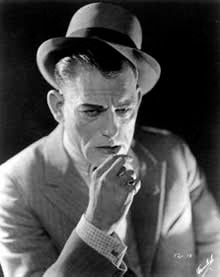February 26, 1919 [The Wicked Darling]
 Seemingly another simple melodrama of the slums: the "rose in the gutter" rises, assisted by the (ruined) gentlemen—and both save each other, while her former associates (with hints of prostitution always floating in the "foul and filthy air") depart and/or expire.
Seemingly another simple melodrama of the slums: the "rose in the gutter" rises, assisted by the (ruined) gentlemen—and both save each other, while her former associates (with hints of prostitution always floating in the "foul and filthy air") depart and/or expire.But almost from the start, inventive camerawork—and more: a (I want to write "Freudian") mood permeates, one of impulses and instincts. A literal rose is tossed in the gutter, and it fades from our eyes, replaced by our heroine, Mary—and even that is noticeable: Priscilla Dean's face is pretty, but easily twisted by shame or sorrow—and this is a compelling constant in the picture: the attention to faces, sometimes glaring in unforgiving light, often grotesquely avid—such as one Kall Pasha as the Bartender, whose displays of threat and rage seem frozen in some animal hysteria, posing for Tod Browning as though the camera—and by extension, the viewer—were in danger of his mad-dog bite. And Spottiswoode Aitkin as "Uncle" Pete Fadem, cheating at Solitaire, his hungry-cat smile oiled as if it had swabbed a tanker's deck. And perhaps most of all Lon Chaney as the girl's "companion," "Stoop" Connors, his head a resisting block of clay, always half-turning away in secretive plots, his eyes glimmering wetly like a dope fiend's—except Stoop's vision is as sharp as a knife.
They all have something to hide, from purloined goods to their true feelings, from a lack of resolve to a dread sense of purpose; and the streets they move in are sprayed with shadows and grime—but their faces still thrust out of the gloom, like cheap but convincing sideshow figures—unnerving because I can't tell where the person ends and the greasepaint-and-putty disguise begins.


Comments
Post a Comment